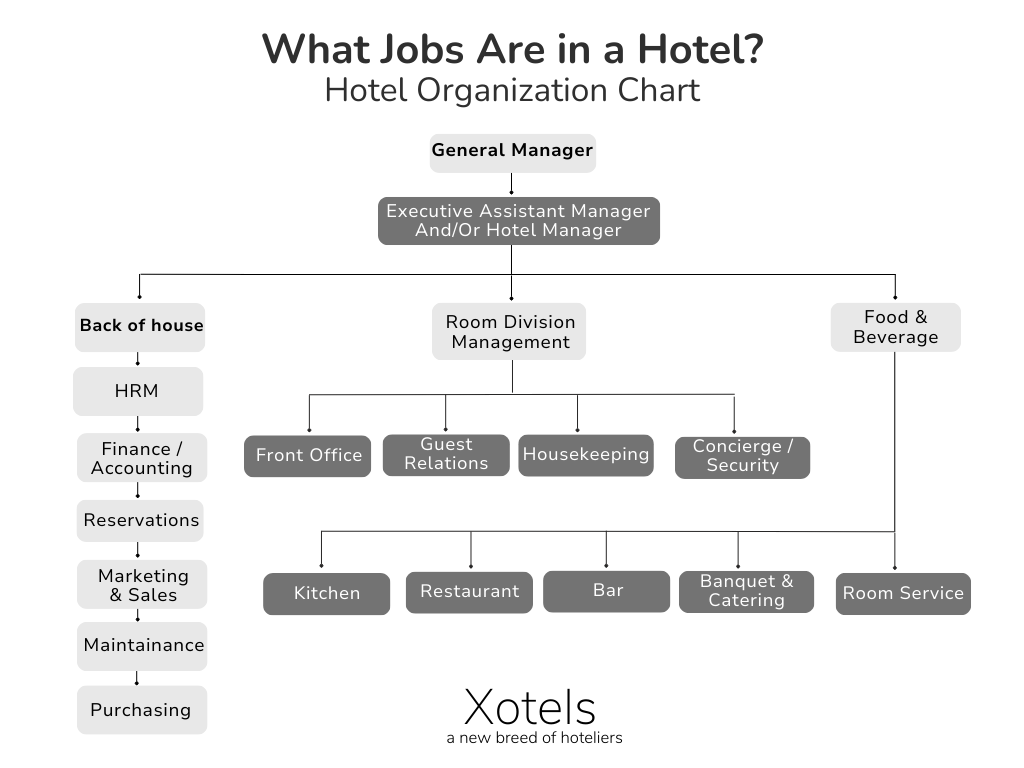What is hotel management, you might ask? And that’s a really good question. The hotel industry is broad and complex, with many stakeholders involved. Did you, for example, know hotels are not just managed by one party but typically have many different players involved in operating the hotel? This is just one of the many important things discussed in this article.
As a hotel management company, we hope this article will help you with the basic concept of hotel management to explore different hotel positions and everything in between. We want to make sure you get the complete picture of what the hotel industry is all about!
Article Summary
- What Is Hotel Management All About, And Why Is It Important?
- History of the Hotel Industry: How It Started & Looking To The Future
- The Future of Hotel Management
- Trends in our Industry
- Hotel Management Strategies
- Hospitality vs. Hotel Management: What’s The Difference?
- Role of Management Companies
- Hotel Management Departments: Every Important Department You Should Know
- Hotel Management Jobs – Organization Chart, Duties and Responsibilities
- What Degree Do You Need To Be A Hotel Manager?
- Final Word: Welcome To The World of Hotel Management
What Is Hotel Management All About, And Why Is It Important?
Hotel management can be defined as a complete set of activities, strategies, and practices that are implemented to efficiently oversee the day-to-day operations of a hotel or any lodging establishment. It encompasses a wide array of tasks that span various departments, all working in harmony to deliver exceptional guest experiences and optimise business performance. From front-of-house functions like guest reception and concierge services to back-of-house operations like finance, and marketing, every facet of a hotel’s functioning falls under the umbrella of hotel management.
Hotel Management Importance
In the competitive hospitality landscape, effective hotel management can make the difference between a thriving establishment and one struggling to stay afloat. A well-managed hotel not only delivers outstanding guest experiences but also maintains a streamlined operation that increases hotel incomes and minimises costs. Additionally, hotel management ensures compliance with industry regulations, maintains the safety of guests and employees, and adapts to evolving consumer preferences and technological advancements.
History of the Hotel Industry: How It Started & Looking To The Future
Delving into the fascinating history of hotels, our journey takes us back to Japan in the 700s, where Ryokans, the original hotels, were set up along the Silk Road. These Ryokans were like cosy rest stops for travellers, marking the early roots of the hospitality scene.
In 17th-century England, a bustling landscape emerged with over 600 inns. These inns weren’t just places to sleep; they were cultural hubs, offering rest and stories to tired travellers navigating their way through a world that was becoming more interconnected.
In the late 1800s, César Ritz stepped onto the scene with a game-changer. In 1893, he did the unthinkable by introducing private bathrooms in every guest room. It might sound ordinary now, but back then, it was nothing short of revolutionary. This move set the stage for a new era in hospitality, where comfort and privacy became paramount.
The Future of Hotel Management
Fast forward to the present day, and the global hotel landscape has exploded. With over 500,000 establishments worldwide, catering to a diverse range of tastes and preferences, the industry continues to evolve. From charming guesthouses to luxurious 5-star hotels, each year brings new technology and trends, keeping things fresh and exciting. Hotels are fully embracing automation, finding cool and innovative ways to invest in sustainability, and adapting to the ever-changing needs of travellers. Take, for instance, the First World Hotel in Malaysia, boasting 7351 rooms and holding the record as the world’s largest hotel. It’s a symbol of the industry’s growth and adaptability, reflecting the ever-evolving nature of our travel experiences.
Now, let us take a look at the hotel industry of the future. Imagine seamless check-ins via mobile, personalised rooms, and sustainability as a top priority. Unique experiences, local integration, and employee well-being shape the narrative. Hotels become more than stays; they’re immersive stories, blending comfort, tech, and warm hospitality.
Trends in our Industry
We see 3 most important trends in the coming years to stay on top of:
- Need for Higher Level Customer Service
- Consumer Trends
- New Concept Trends
Curious to hear our in-depth thoughts about these trends? Read our article about Top Hotel Trends.
Hotel Management Strategies
If you want to read more about management strategies on everything hotel management? Read the articles below:
Hospitality vs. Hotel Management: What’s The Difference?
Hospitality: A friendly reception and entertainment of guests.
Hotel Management: Always talks about hospitality in accommodation
Hospitality Management: Usually refers to a broader definition, incl. restaurants, bars, etc. Everywhere where hospitality is provided
Hospitality and hotel management, while closely related, differ in scope; hospitality management encompasses a broader definition, including restaurants, bars, and various service-oriented fields, whereas hotel management specifically focuses on accommodation. For a comprehensive understanding of the definition of hospitality management, read our full article.
Role Of Management Companies
Hotel management companies are business entities that specialise in operating and overseeing various aspects of hotel properties on behalf of owners or investors.
At its core, a management company can be seen as a strategic partner that empowers hotel owners to navigate the complexities of the hospitality industry with expert advice.
The goal is to maximise the profitability and efficiency of hotels while maintaining a high level of guest satisfaction and service quality. Both single hotels or a portfolio of hotels of different brands and segments can highly benefit from the expert services and advice provided a tailored approach is offered.
To learn more read our full article on What Does a Hotel Management Company Do.
Hotel Departments: Every Important Department You Should Know

Now that we’ve explored the basics of the hotel industry let’s delve into its diverse departments. Typically classified as ‘front of house’ or ‘back of house,’ these departments collectively ensure the smooth functioning of a hotel. The front of the house encompasses guest-facing roles such as receptionists, servers, housekeepers, and concierge. In contrast, the back of the house includes departments often not visible to guests, like sales and marketing, human resources, and the financial departments.
Front Office & Guest Relations:
The hotel’s initial point of contact is the front desk, shaping guests’ first impressions. Efficient check-ins, check-outs, and responsive handling of inquiries are paramount in establishing positive guest experiences. Hotel management focuses on meeting guests’ needs throughout their stay, fostering high satisfaction and loyalty.
Housekeeping & Maintenance:
Guest perceptions of a hotel are heavily influenced by the cleanliness and maintenance of rooms and common areas. Hotel management oversees effective housekeeping and maintenance procedures, ensuring well-maintained, hygienic, and aesthetically pleasing premises.
Food & Beverage Management:
From restaurants to room service, culinary offerings significantly influence guest experiences. Hotel management oversees menu planning, food quality, pricing, and service standards to guarantee a delightful dining experience.
Marketing:
Attracting and retaining guests requires effective promotion and marketing strategies. Hotel management collaborates with marketing teams to create enticing campaigns, manage online presence, and utilize various distribution channels to maximise bookings.
Revenue Management & Sales:
Effective sales strategies are crucial for driving revenue. Hotel management works closely with sales teams to implement successful sales initiatives. A hotel revenue manager plays a crucial role in steering pricing strategies to optimize the financial performance of a hotel. Their main responsibility involves creating effective rate strategies, which are then applied to the hotel’s sales and marketing initiatives. The overarching objective is to strategically position the hotel in the market, setting the stage for success and increased profitability.
Financial Management:
The backbone of any successful business lies in efficient financial management. Hotel management handles budgeting, revenue forecasting, cost control, and financial analysis to ensure profitability while maintaining service quality.
Human Resources:
A skilled and motivated workforce is essential for exceptional guest experiences, a principle deeply ingrained in prominent hotel companies’ core values. Take, for instance, Marriott’s commitment expressed through their slogan ‘We Put People First,’ where employee satisfaction takes precedence as their number one value. Similarly, teamwork is mentioned in Hilton’s core values, highlighting the importance of collaboration within the team.
Human resources oversee hiring, training, and employee relations, fostering a positive work environment that reflects guest satisfaction.
Hotel Jobs – Organization Chart, Duties and Responsibilities
In the hotel management departments mentioned earlier, a diverse range of positions contributes to the smooth operation of the establishment.
Rutherford’s 2002 study on hotel organisation structures in the United States highlighted the evolution from central figures like the chef and “maitre d’hotel” to a hierarchical structure, with the General Manager (GM) at the helm. Some researchers confirmed this idea over the years, while others sought alternative perspectives on organisation charts in the hotel industry. Conklin, for instance, introduced the reverse organisation chart in 2002, which depicted an upside-down triangle highlighting the importance of customers, then employees, the managers and, at the bottom, the GM.
Below, you’ll find our own version of the hotel organisation chart:

In some organisations, there may be only an Executive Assistant Manager, while others may have only a Hotel Manager. Larger hotels may have both. The Executive Assistant Manager (EAM) holds a senior role overseeing specific departments, reporting to the General Manager (GM). The Hotel Manager, on the other hand, is responsible for the daily operations of the entire hotel, ensuring optimal efficiency across all departments.
Hotel Jobs Responsibilities
Below we specify the main duties and responsibilities per job.
- General manager:
- Main duties: Oversee hotel operations, hold regular briefings with department heads, and ensure compliance with operating controls, SOPs, policies, and service standards.
- Main responsibilities: Lead key property issues, handle complaints, avoid negative guest reviews and service recovery, manage the hotel’s budget and profitability, and make strategic decisions for achieving short and long-term goals. Additionally, coordinate with department heads, respond to audits, and handle corporate client relationships and legal requirements.
- Executive assistant manager:
- Main duties: Plan and organise operational procedures, coordinate with department heads, and implement strategies for rooms, F&B, and leisure & recreation departments.
- Main responsibilities: Set yearly revenue targets, upgrade hotel standards, liaise with sales & marketing manager on departmental strategy, conduct interviews, project business opportunities, and develop formal training plans. Participate in strategic planning, marketing, and goals program, and regularly update the General Manager on operational achievements and key issues.
- Front desk associate:
- Main duties: Register guests, assign rooms, and adhere to credit and cash handling policies. Utilise sales techniques to present options and alternatives to guests.
- Main responsibilities: Coordinate with housekeeping, perform cashiering tasks, issue parking passes, and communicate hotel services to guests. Attend meetings, follow safety procedures, and maintain front desk cleanliness.
- Housekeeper:
- Main duties: Clean guest rooms mid-stay and after departure, make beds, replace linens and towels, and restock guest room amenities.
- Main responsibilities: Remove garbage and room service trays, pick up and return valet laundry items, organise housekeeping carts, and notify maintenance of any issues. Additionally, uphold confidentiality and security standards, respect guest privacy, and ensure compliance with hotel policies.
- Barman:
- Main duties: Interact with customers, take orders, and serve drinks and snacks while maintaining a clean bar counter.
- Main responsibilities: Check guest IDs, mix cocktails, handle cash transactions, and maintain liquor inventory. Comply with regulations, ensure an excellent guest experience, and perform other duties as assigned by hotel management. Good communication skills in English and a positive personality are prerequisites.
- Restaurant employee (host, server etc.):
- Main duties: Greet hotel guests, present menus, and inform them about daily specials. Take orders, suggest items, and perform basic cleaning tasks as directed.
- Main responsibilities: Used the POS system to punch orders, coordinated with staff for smooth operations, and served food and beverages. Ensure guest satisfaction, respond to requests promptly, and maintain a proper dining experience.
- Concierge:
- Main duties: Greet and welcome guests, serve as a reference point for assistance, and understand customer needs to provide personalised solutions.
- Main responsibilities: Acquire extensive knowledge of the premises and nearby venues, arrange events and transportation, answer phones, make reservations, and handle complaints with appropriate solutions.
- Engineering and maintenance employee:
- Main functions: Maintaining the physical infrastructure, ensuring safety, and overseeing repairs and renovations.
- Main responsibilities: Implementing preventive maintenance programs, managing equipment, and coordinating with contractors.
- Reservations agent:
- Main duties: Assist customers in choosing travel options, make reservations based on requirements and budget, and check availability of accommodation or transportation.
- Main responsibilities: Help plan travel itineraries, process payments, and address any booking issues. Sell and promote reservation services, answer customer questions, and support reservation amendments or cancellations.
- Marketing and sales associates:
- Main duties: Set marketing goals, design strategies for business targets, and create digital campaigns to boost web traffic.
- Main responsibilities: Analyse sales metrics, forecast market trends, and research for new opportunities. Generate innovative ideas for brand promotion, address advertising needs, and maintain brand consistency across channels. Utilise customer feedback for satisfaction, collaborate with internal teams and establish a long-term web presence.
- Hotel accountant:
- Main duties: Manage financial transactions, produce accurate month-end accounts, and prepare profit and loss accounts and balance sheets for senior management.
- Main responsibilities: Control payroll, assist in budget preparation, reconcile bank statements, ensure compliance with VAT and PAYE legislation, and actively manage cash flow, including chasing late payments and reporting bad debts.
- Revenue manager:
- Main duties: Implement revenue management operations, identify new revenue opportunities, and optimise distribution partnerships.
- Main responsibilities: Oversee the revenue management and distribution strategy, conduct daily pick-up analysis, and provide a weekly dynamic forecast. Additionally, it will analyse overall monthly hotel performance, assess pricing strategies, and inspire hotel department heads to embrace a revenue management culture.
Interested in working at Xotels? See our Hotel Revenue Manager Job Description.
What Degree Do You Need To Be A Hotel Manager?
To excel in hotel management, a degree in hospitality management is highly recommended, To thrive in the dynamic world of hotel management, it’s highly recommended to pursue a degree in hospitality management. Opting for a bachelor’s or master’s degree in Hotel Management, Tourism, Business Administration, or Economic Studies is often the preferred route. Alongside your academic journey, honing strong computer skills, including data analysis and familiarity with hotel technologies, will give you a competitive edge.
Practical experience is where the real magic happens in hotel management. Hands-on experience in hotel revenue management, reservations, and operations is invaluable. In this global industry, where you’ll be interacting with guests from around the world, proficiency in English—both written and spoken—is a must.
Combining your formal education with practical know-how creates a well-rounded skill set essential for a successful career in hotel management. While there are lists out there ranking The Best Hotel Management Schools in the World, we recommend visiting different schools personally. It’s like trying on shoes; you want to find the one that fits just right.
Final Word: Welcome To The World Of Hotel Management
Wrapping up this journey into the hotel management world. From delving into the roots of the hotel industry to peering into its future, we’ve covered it all.
So, what is hotel management? It’s the all-encompassing art of effectively running a hotel, where the guest experience takes centre stage. It’s not just about managing rooms and services; it’s about curating an experience and making sure every guest feels at home.
As we go our separate ways, here’s a nugget to carry with you: whether you’re eyeing a career in hotel management or just captivated by the behind-the-scenes magic. The hotel management world thrives on fresh perspectives and innovative ideas; there’s always room for more. And for those contemplating a deeper dive into exploring avenues like revenue management consulting and teaming up with a hotel management company, we hope this helps you unlock a new dimension in your journey.
Best of luck on your journey – may it be as exhilarating as a surprise upgrade to the penthouse suite!




